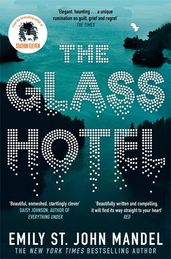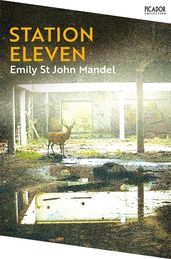‘When it comes to capitalism, the virus is greed.’ Octavia Bright on the capitalist dystopia of Emily St. John Mandel’s The Glass Hotel
Writer Octavia Bright discusses the capitalist dystopia of Emily St. John Mandel’s The Glass Hotel and its parallels with the author’s bestselling pandemic novel Station Eleven.

Fans of Emily St. John Mandel’s bestselling dystopian novel Station Eleven have eagerly awaited her new novel The Glass Hotel. Although set in a universe recognisable to readers of Station Eleven, The Glass Hotel at first seems a very different book to Emily’s pandemic dystopia. But, with its focus on the inequalities of late capitalism, the book can actually be read as a capitalist dystopia, as Octavia Bright argues here.
Discover our edit of the best dystopian fiction of all time.
‘Money is its own country,’ Mirella tells Vincent in The Glass Hotel. The young women are at a private club in Miami Beach with their wealthy boyfriends, at a party where everyone looks the same: ‘the curious sameness of expensively maintained people with similar habits’. A bartender who grew up in a remote part of Vancouver Island, Vincent doesn’t come from money, but she’s a natural code switcher and fast learns how to pass in its glitzy, homogenous kingdom.
The glass hotel of the title is Hotel Caiette, located in the wilds near where Vincent grew up. Surrounded by dense forest, it’s a striking location that emphasises the tension between the false transparency of the elite (and how they build their empires) and the forest with all its connotations of libidinous, subconscious power: it offers its wealthy clientele, as Mandel puts it, ‘the idea of wilderness’ without any of ‘the unglamorous labour of it’. There’s a parallel with the kingdom of money that this novel wants to make clear: the visible glamour is only a fraction of what’s churning away out of sight, and this tale of capitalism and corruption peels back the façade to reveal all that’s rotten underneath – the unglamorous labour propping up the glass houses of the kingdom of money.
‘There’s a parallel with the kingdom of money that this novel wants to make clear: the visible glamour is only a fraction of what’s churning away out of sight, and this tale of capitalism and corruption peels back the façade to reveal all that’s rotten underneath – the unglamorous labour propping up the glass houses of the kingdom of money.’
In the last six months, the significance of national borders has been brought into sharp relief. Watching the spread of Covid-19 as it continues its chaotic but determined march around the globe, we’ve become accustomed to waking each morning to a tangle of figures determined by these borders: numbers of new infections, numbers of deaths. Numbers both arbitrary and devastating. Borders that open and close depending on infection rates, which fluctuate along with the numbers. Privileges granted and rescinded by a virus.
This will be familiar to readers of Station Eleven, Mandel’s previous smash hit work of dystopian fiction that tells the story of a pandemic. The spread happens fast, the novel unfolds after, showing us a parallel world of satellite communities, local gods and despotic abuses of power. It’s unnerving when a work of fiction begins to look like a prophecy. Thankfully, we haven’t yet reached the stage of cult leaders and fringe communities.
And what of the kingdom of money, protected by its invisible borders? As the economy grinds to a halt and throws the majority of us into great financial uncertainty, we watch as those usually insulated by extreme wealth and privilege continue to be so. Around the world, as lockdowns were implemented and people dutifully confined themselves to their homes, however cramped, the super-rich escaped crowded cities for bucolic second houses, visited castles, chartered private jets. You see, the kingdom of money is a dystopian reality that has always existed, a parallel world for the one per cent that sits like a palimpsest on the one inhabited by the other ninety-nine.
‘You see, the kingdom of money is a dystopian reality that has always existed, a parallel world for the one per cent that sits like a palimpsest on the one inhabited by the other ninety-nine. ’
The aim of dystopian fiction is usually to offer a fresh perspective on social and political realities that might otherwise be considered inevitable. In The Glass Hotel, Mandel shines a light on the inequality and dodgy deals that prop up the superficial world of extreme wealth. There’s a suggestion that this is set in the same, or a parallel, universe as Station Eleven – a couple of the same characters show up – but the great equaliser in the form of The Georgia Flu never arrives. Looking at our own ‘before times’, it’s clear that the inequalities and abuses of late capitalism have made our real-life pandemic story infinitely worse: health systems at breaking point after years of austerity, racist and inhumane border policies, a financial culture that prioritises profit above people. We’ve been living with the dystopia of extreme wealth and inequality for a long, long time, and the lesson of The Glass Hotel is that when it comes to capitalism, the virus is greed.
The Glass Hotel
by Emily St. John Mandel
When Vincent, a beautiful bartender at the Hotel Caiette, meets the hotel's owner, New York financier Jonathan Alkaitis, she immediately agrees to start a new life with him. That same night, an unknown person graffitis the window of the hotel with the words 'Why don't you swallow broken glass.' The staff, and a guest, shipping executive Leon Prevant, are left shaken by the malicious message. Thirteen years later, Vincent disappears from a ship owned by the same company Leon worked for . . .
Emily St. John Mandel's extraordinary novel moves between time and place to explore greed and guilt, fantasy and delusion, the interconnectedness of our lives and the ghosts of our pasts.
Station Eleven
by Emily St. John Mandel
Station Eleven moves backwards and forwards in time, presenting the recognisable years just before a flu epidemic brought about the collapse of civilisation alongside the strange and altered world that exists twenty years after. It’s a novel that asks questions about art and fame and about the relationships that sustain us through anything – even the end of the world




